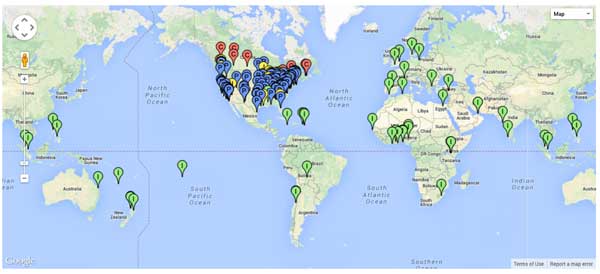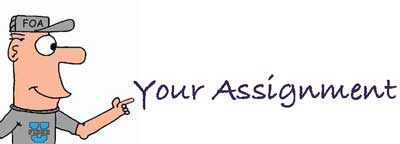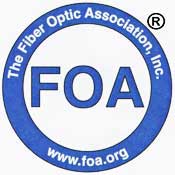Objectives:
From this lesson you should learn:
What is the
FOA?
What the
FOA expects from a FOA-approved school?
What the FOA
expects from a FOA-certified instructor?
What the FOA
expects a FOA-certified instructor to teach?
What experienced FOA instructors have learned helps
students learn in fiber optic classes?
What resources does the FOA make available for its
instructors?
Use this lesson to learn about the FOA and how it's approved school and certification
programs operate.
- What Is
The FOA? A short history
- FOA
was
founded in 1995 by more than a dozen
individuals who
wanted the industry to have its own
professional association, an organization that would promote fiber
optics through education, certification and
standards. The timing was such that the FOA was needed to develop a
fiber optic workforce to build the Internet as it was starting to expand
around the world. After more than a quarter-century, the FOA is the
worldwide leader in fiber optic workforce development and the most
recognized certifying body for telecommunications techs.
- The founders were all "old-timers" already; most had
over a decade of experience in the industry and many
had been training others for most of that time. Among
the founders, two were full time college professors
who created the first college level programs in fiber
optics. They brought to the FOA their experience and
knowledge of teaching and especially testing. Others
involved were from industry who had been training
their customers to install fiber optic networks using
their products, from the government and military who
were not only training personnel, but were writing
standards for military applications of fiber
optics.
- For the
first few years, these founders met quarterly to set
the standards for education and certification. Those
from industry and government contributed the practical
knowledge needed to create standards for training and
certification - the KSAs, knowledge, skills and abilities - that would ensure those trained under
FOA standards and certified by the FOA would be
properly prepared for working in the industry -
not experts yet, but fully capable of "OJT - on the job
training" to make them productive personnel as soon as
possible. The academic point of view brought to the
FOA by the college professors ensured that the FOA
curriculum was well organized and complete and FOA
certification tests were properly constructed to be
appropriate for the certification, easily understood
and unambiguous, and have definitive references to
every question. We believe the FOA approach has been a
major contributor to the acceptance of the FOA
certification by industry, users, governments, etc.
worldwide.
Since the FOA focus was on
the fiber optic tech, we had to create our own educational materials.
Our advisors came from all types of companies and applications so FOA
built up the world's largest knowledge base for fiber optics, online at
the FOA Guide and in our textbooks, much in multiple languages.
To date these many techs have been certified by FOA, many of whom have multiple certifications:

The FOA has schools in many
countries around the world, so the FOA has tried to make
its reference materials, websites, tests, etc. as
international as possible. We try to cover the whole world
in our technology and standards. Our only concession
is we still spell "fiber" as "fiber," while much of the
world uses the spelling "fibre."

The FOA still works the same way as when we started, as a large
"virtual" organization. There is no FOA headquarters
building, no big staff. We exist as a worldwide network of advisors who
use email, teleconferencing, etc. to collaborate
on projects. Technical materials, self-study programs,
newsletter articles and the certification programs
represent the collaboration of the FOA advisors who still
represent a broad cross-section of the industry.
And the FOA is a recognized "non-profit
professional association." We receive income from certifications
and book royalties and spend it on promoting
the industry by providing technical reference
materials to
the industry and supporting our schools and
members with
curriculum and certifications. We also participate
in many
industry standards activities like ANSI, TIA and
ISO/IEC.
Why are we telling you this? Student will ask you
questions about it, like "What is the FOA?" (see above),
"Who recognizes the FOA?" (lots of groups including
companies in the industry, government organizations like
the US Department of Labor, the telecom authorities of
many countries, lots of local organizations too, unions
like IBEW and CWA, etc.), "Why do they give so much stuff
away?" (we are chartered to promote the industry through
education, certification and standards and the best way to
do that is provide technical information and help our
schools offer the best training in the business.)
By the way, the reason FOA can afford to give all this away is we get
income from our certifications and renewals, so remind everyone to renew
their certification when it expires to support the FOA.
To help you understand the FOA, we have created a short
video for you to show your students in the beginning of a
class. It's a variation of the YouTube video "About
The FOA" but aimed at students. Download it from the
school download page you will have access to after you get
certified as an instructor.
Read more about the FOA.
Responsibilities of the Instructor
As a FOA-certified instructor teaching at an FOA-approved
school, it is your job to maintain the standards of the
FOA.
You are expected to teach courses well, including
developing and maintaining your skills at cable
preparation, splicing, termination and testing as needed
for teaching hands-on labs. Not only must you have those
skills to teach the labs, you must also be able to
evaluate your students skills in order to sign their
applications confirming that they have demonstrated
adequate skills in these labs.
Classrooms And Labs
Typically, classrooms are where the student gains the
knowledge about a subject and hands-on labs are where they
demonstrate their abilities and learn new skills. The FOA
provides basic curriculum in
the form of PPTs, videos, instructor guides and student
manuals for basic courses that cover both classroom topics
and lab exercises.
Online and Blended Learning
FOA has been offering online self-study programs for years
through our free online learning website Fiber U. As you know from
reading the FOA KSAs, every FOA certification requires
hands-on skills which obviously one cannot learn through
online courses. However, having students study the Basic
Fiber Optics course on Fiber U is a perfect way to prepare
them for taking a class, as the classroom learning will
proceed more quickly and more time can be devoted to
hands-on labs to develop skills. A blended learning class
has the students do most of the classroom work online,
with an instructor available to assist them, then they
come into the classroom primarily for the labs and a review
before the certification exam.
The FOA "Community"
We have described the FOA as a virtual organization,
created by the communications among the schools,
instructors and members. Becoming a FOA-certified
instructor includes joining this community. We expect you
to participate in the development and updating of
reference materials, curriculum and updates on the exams,
sharing your knowledge, especially local information that
may help the FOA produce better curriculum and reference
materials that have worldwide significance. Within the
group of FOA instructors and schools, cooperation has led
to a more powerful organization that has benefited us all.
What CAN'T a FOA-Certified Instructor Do?
FOA-certified instructors cannot delegate the teaching of
a FOA certification course to anyone who is not a
FOA-certified instructor nor can they sign applications
for any students except those attending the classes they
teach themselves.
FOA-certified instructors cannot certify other instructors
- all instructor certifications must be done by the FOA
itself.
Instructors may not teach a course unless they have the
certification for that course. FOA requires all
instructors take the certification for any class they
teach, e.g. CFOS/T for teaching a testing specialist
course, so the instructor can prove their qualification
for teaching that course and is aware of the material
covered on the exam.
Instructors may not leave the school that sponsored their
certification and take their instructor certification to
another school or start their own school without FOA
permission. Instructors wanting to change schools may
apply to the FOA for a change in school.

Assignment -
Learn About The FOA And Its Approved School Programs
Download
the FOA Instructor
CFOS/I Certification PowerPoint (PDF
w/notes, 20MB)
We have a train-the-trainer (TTT) presentation
that is available for your viewing in PDF format
complete with Notes to explain what each slide means. This is good
practice as that is how the FOA provides its curriculum slides for each
certification. Be sure you read the notes for each
slide as they tell you what you need to know.
When you have studied the PPT slides and notes, take the test below to
test your comprehension before you take the instructor
certification exam which will test your knowledge of this lesson
as well as the technical material.
Test your comprehension: After studying the FOA TTT PPT, take this test to check your comprehension:
Link:
https://www.classmarker.com/online-test/start/access-code/?quiz=m3n65790f784de85
PasswordL Use the password given to you when you were directed to take this course or contact FOA at info(at)foa.org
When you are ready to take the FOA CFOS/I or CPCT/I Instructor Certification Exam, contact FOA for directions.
Lessons
Lesson
1: Technical Topics - Fiber Optics (CFOT, CFOS/I)
Lesson
1a: Technical Topics - Premises Cabling (CPCT,
CPCT/I)
Lesson 2: Teaching The FOA Way
Instructor Exam:
Taking the CFOS/I or CPCT/I Exam
Back to the Lesson Plan
|

